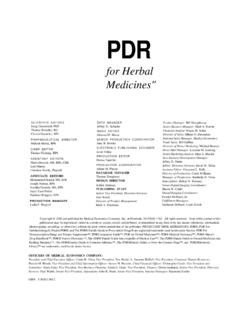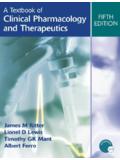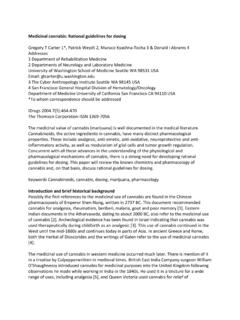Transcription of Dr. Jenna Henderson drhenderson@holistic-kidney.com www ...
1 Dr. Jenna Disclaimer The KDIGO CKD guideline states: We recommend not using herbal remedies in people with CKD. (Level of evidence: 1B) Patients often chose alternative medicine either with self medication or working with an alternative practitioner. Beneficial to understanding what the patients are and family often looking for alternatives to mainstream medicine for a variety of reasons: Side effects of medications, particularly prednisone and other immune suppressants. Medications often not successful at bringing remission. Cost of medications can be prohibitive for many families. Personal preferences toward natural remedies. Fear of dialysis. A willingness to do anything except Understanding of what professionals might recommend herbal medicine.
2 What herbs are commonly used by kidney patientswhen they self medicate. Awareness of research in the field of botanical medicine as it pertains to nephrology. Some herbs that show potential in research for treating specific kidney conditions. Knowing what herbs to be concerned about with potassium and phosphorus. Red flags of when to be concerned about patient : 64% According to Journal of Renal Nutrition Nov : 33% 40%Nephrology and alternative medicine often worlds apart Completely different terminology. Nephrologists are not trained in herbal medicine. Alternative practitioners usually have a limited understanding of nephrology, especially advanced kidney disease, dialysis and transplantation.
3 Many patients self-medicate with herbs and don t tell their MD. Many patients take advice from individuals who are not qualified, especially are many professions in which there is some formal training with botanical medicine. American Herbalists Guild (AHG) recommends many different training programs. Acupuncturists (Lac) or Doctor of Oriental Medicine (DOM) will have training with traditional Chinese botanicals. Programs to study traditional Indian herbs (Ayurveda) Naturopathic doctors (ND) are the only professionals trained with both mainstream medicine and herbal medicine. Core curriculum includes botanical medicine and pharmacology. Not all who call themselves naturopathic doctors are in fact doctors.
4 Unaccredited programs exist in unlicensed states. Often referred to as un-Ds . Bio Dr. Henderson has been a kidney patient since 1993. Has gone through renal failure, dialysis and transplantation. Attended an accredited 4-year doctoral program. Wrote doctoral thesis on Botanical Medicine as Adjunctive Therapy for the Transplant Patient. Licensed by the state of Connecticut. Has the largest naturopathic practice exclusively for renal patients, with consultations from around the world. Does this alternative practitioner understand kidneys disease? Be alert to red flags: They don t understand the difference between kidney failure and nephrotic syndrome. All kidney advice lumped together, whether diabetic nephropathy, nephrotic syndrome, polycystic kidneys, kidney stones or kidney infection.
5 Claiming that the body is too acidic based on the pH of the urine. Extreme diets or overblown claims--macrobiotics, raw juice fasting, t walk--run! Willingness to give off-the-cuff advice without reviewing labs or history. A more is better approach to drinking water. Practitioners who want patients to abruptly stop all medications. Practitioners who encourage patients to stop seeing a nephrologist. Practitioners who discourage dialysis when the patient is clearly in kidney or FalseWhat to consider for with herbal information online: Does this writer have formal training in botanical medicine? Does this writer understand kidney disease? Are they grouping together all types of kidney issues--kidney stones, UTI and kidney failure?
6 Are they citing tradition, personal anecdotes, clinical practice or peer reviewed studies? All of the above could be potentially useful but know what you re dealing resources exist to learn about peer reviewed research into herbal medicine? NIH website Guidebook published by the German government equivalent of the FDA translated into English: herbal Medicine: Expanded Commission E Monographs. Considered by many to be a definite guidebook. (Note info. on transplant medicine safety is lacking.) Nutritional Herbology: A Reference Guide to Herbs by Mark Pedersen. Useful information on potassium and phosphorus content. Additional resources: Natural Medicine Journal the official journal of the American Association of Naturopathic Physicians.
7 HerbalGram the journal of the American Botanical Council. online herbal library. NDNR Naturopathic Doctors News & Reviews Townsend Letter: The Examiner of Alternative MedicineUnderstanding what kidney patients encounter when they look to natural medicine. Safety of herbs. Herbs to approach with caution Herbs marketed for kidney problems Culinary herbs Herb/drug interactions Beneficial herbs for CKD Herbs for dialysis patients Herbs and the transplant patientHerbs often perceived as being less dangerous than prescription medications. Large number of prescription medications are synthetic forms of compounds originally discovered in plants. Prescription medications are a large dose of a single chemical compound.
8 herbal preparations contain the active constituent plus a myriad of cofactors which often mitigate side effects. Low dose of any one compound makes it harder to isolate a single factor. Usually combined effect of many chemically naturally occurring in the plant. The good and the bad Often fewer side effects. Compare white willow to aspirin or Cyclosporine to Cordyceps mushroom. Far fewer fatalities from herbal medicine. Harder to quantify the active chemical components. Herbs cannot be patented. Therefore far less financial incentive to study. Many animal studies. Fewer human studies. Herbs with extensive histories usually classified as GRAS--generally recognized as safe. Herbs/ remedies for kidney patients to avoid or use with caution with advice of qualified practitioner.
9 Stimulants that can raise blood pressure such as Yohimbe. Ma Huang (Ephedra) Guarana Licorice--increases aldosterone and water retention. Strong laxatives like senna and cascara segrada. Essential oils/ aromatherapy Colloidal silver Be suspicious of very inexpensive supplements. Phosphorus (P) additives. Phosphatidylserine, phosphatidylcholineHerbs commonly marketed to kidney patients Generally oriented toward UTI or kidney stones. Very little aimed toward chronic kidney disease. Botanical medicine kidney formulas will usually includes 1 or more of the following: Diuretic Demulcent Antibacterial agentHerbal diuretics--do the kidneys really need to be cleansed? Often sold in health food stores often as detox teas.
10 These include uva ursi, juniper, buchu, goldenrod, dandelion, parsley. Diuretics push the kidneys to work harder. They don t build the kidneys or do anything to protect kidney tissue from the damage of chronic kidney disease. Lasix is still best bet for water retention herbs Soothing to irritated membranes. Often a gummy texture due to mucopolysaccharides. Aloe vera topically for burns is an example of a demulcent. For kidneys--slippery elm, marshmallow tea, corn silk or aloe vera juice. Soothing to kidney membrane. Clinically useful with hematuria. NOT safe post-transplantAntibacterial agents Cranberry or blueberry. Fruit, fruit juice or encapsulated extract. Inhibits bacteria from adhering to lining of urinary tract.






